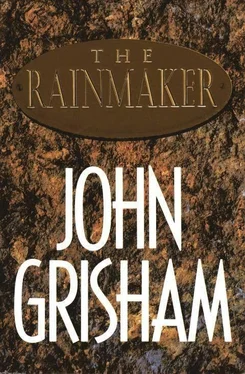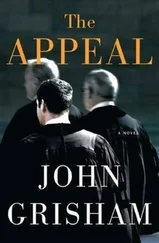“What does this test cost?” I ask.
“Around a thousand dollars.”
“And how did Donny Ray pay for it?”
“When he first came to the office, he filled out the normal forms and said he was covered under a medical policy issued by Great Benefit Life Insurance Company. My staff checked with Great Benefit, and verified that such a policy did in fact exist. I proceeded with the treatment.”
I hand him copies of the documents relevant to this, and he identifies them.
“Did you get paid by Great Benefit?”
“No. We were notified by the company that the claim was being denied for several reasons. Six months later the bill was written off. Mrs. Black has been paying fifty dollars a month.”
“How did you treat Donny Ray?”
“By what we call induction therapy. He entered the hospital and I placed a catheter into a large vein under his collarbone. The first induction of chemotherapy was with a drug called ara-C, which goes into the body for twenty-four hours a day, seven straight days. A second drug called idarubicin was also given during the first three days. It’s called ‘red death’ because of its red color and its extreme effect of wiping out the cells in the bone marrow. He was given Allopurinol, an anti-gout agent, because gout is common when large numbers of blood cells are killed. He received intensive intravenous fluids to flush the by-products out of his kidneys. He was given antibiotics and anti-fungus treatments because he was susceptible to infection. He was given a drug called amphotericin B, which is a treatment for funguses. This is a very toxic drug, and it ran his temperature to 104. It also caused uncontrolled shaking, and that’s why amphotericin B is known as ‘shake and bake.’ In spite of this, he handled it well, with a very positive attitude for a very sick young man.
“The theory behind intensive induction therapy is to kill every cell in the bone marrow and hopefully create an environment where normal cells can grow back faster than leukemic cells.”
“Does this happen?”
“For a short period of time. But we treat every patient with the knowledge that the leukemia will reappear, unless of course the patient undergoes bone marrow transplantation.”
“Can you explain to the jury, Dr. Kord, how you perform a bone marrow transplant?”
“Certainly. It’s not a terribly complicated procedure. After the patient goes through the chemotherapy I just described, and if he or she is lucky enough to find a donor whose match is close enough genetically, then we extract the marrow from the donor and infuse through an intravenous tube to the recipient. The idea is to transfer from one patient to another an entire population of bone marrow cells.”
“Was Ron Black a suitable donor for Donny Ray?”
“Absolutely. He’s an identical twin, and they’re the easiest. We ran tests on both men, and the transplant would’ve been easy. It would’ve worked.”
Drummond jumps to his feet. “Objection. Speculation. The doctor can’t testify as to whether or not the transplant would’ve worked.”
“Overruled. Save it for cross-examination.”
I ask a few more questions about the procedure, and while Kord answers I pay attention to the jurors. They’re listening and following closely, but it’s time to wrap this up.
“Do you recall approximately when you were ready to perform the transplant?”
He looks at his notes, but he knows the answers. “August of ’91. About eighteen months ago.”
“Would such a transplant increase the likelihood of surviving acute leukemia?”
“Certainly.”
“By how much?”
“Eighty to ninety percent.”
“And the chances of surviving without a transplant?”
“Zero.”
“I tender the witness.”
It’s after twelve, and time for lunch. Kipler adjourns us until one-thirty. Deck volunteers to fetch deli sandwiches, and Kord and I prep for the next round. He’s savoring the idea of sparring with Drummond.
I’ll never know how many medical consultants Drummond employed to prepare for trial. He’s not obligated to disclose this. He has only one expert listed as a potential witness. Dr. Kord has repeatedly assured me that bone marrow transplantation is now so widely accepted as the preferred means of treatment that no one but a quack would claim otherwise. He’s given me dozens of articles and papers, even books, to support our position that this is simply the best way to treat acute leukemia.
Evidently, Drummond discovered pretty much the same thing. He’s not a doctor, and he’s asserting a weak position, so he doesn’t quarrel too much with Kord. The skirmish is brief. His main point is that very few acute leukemia patients receive bone marrow transplants compared with those who don’t. Less than five percent, Kord says, but only because it’s hard to find a donor. Nationwide, about seven thousand transplants occur each year.
Those lucky enough to find a donor have a much greater chance of living. Donny Ray was a lucky one. He had a donor.
Kord looks almost disappointed when Drummond surrenders after a few quick questions. I have no redirect, and Kord is excused.
The next moment is very tense because I’m about to announce which corporate executive I want to testify. Drummond asked me this morning, and I said I hadn’t made up my mind. He complained to Kipler, who said I didn’t have to reveal it until I was ready. They’re sequestered in a witness room down the hall, just waiting, and fuming.
“Mr. Everett Lufkin,” I announce. As the bailiff disappears to fetch him, there’s a burst of activity at the defense table, most of it, as far as I can tell, worth nothing. Just papers being pushed around, notes being passed, files being located.
Lufkin enters the courtroom, looks around wildly as if he’s just been roused from hibernation, straightens his tie and follows the bailiff down the aisle. He glances nervously at his support group to his left, and makes his way to the witness stand.
Drummond is known to train his witnesses by subjecting them to brutal cross-examinations, sometimes using four or five of his lawyers to pepper the witness with questions, all of it recorded on video. He’ll then spend hours with the witness watching the tape and working on technique, prepping for this moment.
I know these corporate people will be immaculately prepared.
Lufkin looks at me, looks at the jury and tries to appear calm, but he knows he can’t answer all the questions that are coming. He’s about fifty-five, gray hair that starts not far above his eyebrows, nice features, quiet voice. He could be trusted with the local Boy Scout troop. Jackie Lemancyzk told me he wanted to tie her up.
They have no idea she’ll testify tomorrow.
We talk about the claims department and its role in the scheme of things at Great Benefit. He’s been there eight years, VP of Claims for the past six, has the department firmly in control, a real hands-on type of manager. He wants to sound important for the jury, and within minutes we’ve established that it’s his job to oversee every aspect of claims. He doesn’t oversee every single claim, but he has the responsibility of running the division. I’m able to lull him into a boring discussion about nothing but corporate bureaucracy, when suddenly I ask him, “Who is Jackie Lemancyzk?”
His shoulders actually jerk a bit. “A former claims handler.”
“Did she work in your department?”
“Yes.”
“When did she stop working for Great Benefit?” He shrugs, just can’t remember the date. “How about October 3 of last year?”
“Sounds close.”
“And wasn’t that two days before she was scheduled to give a deposition in this case?”
“I really don’t remember.”
Читать дальше












